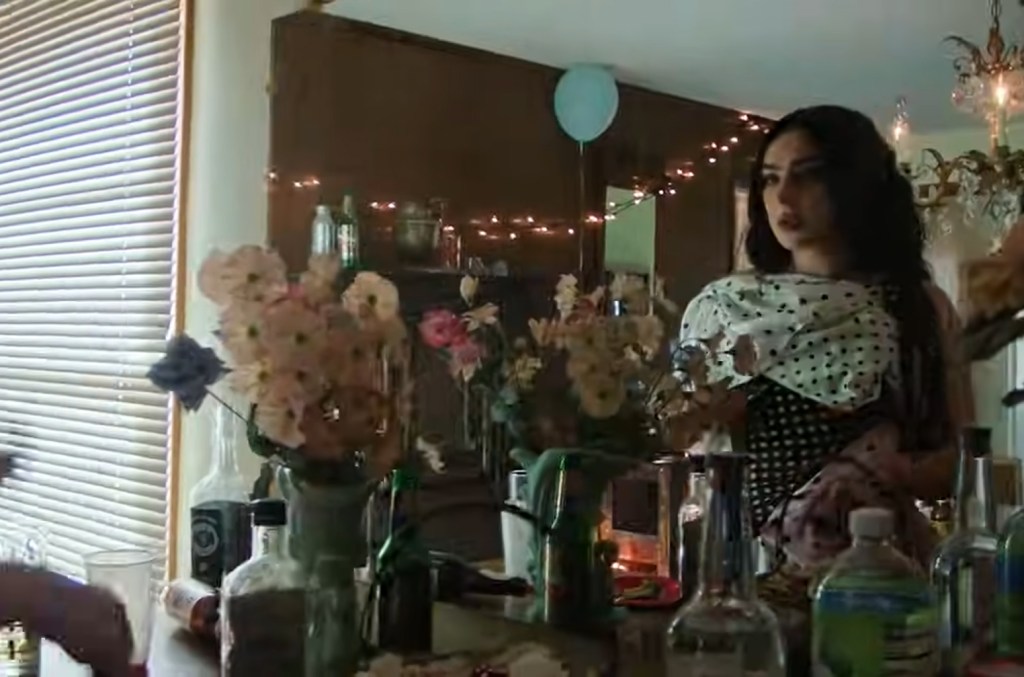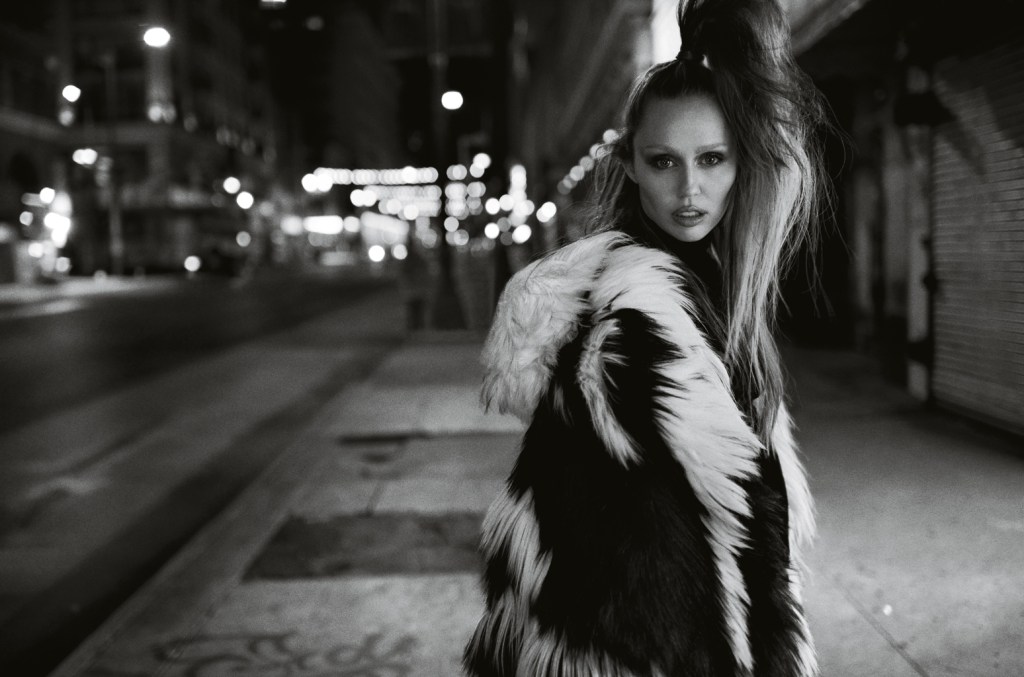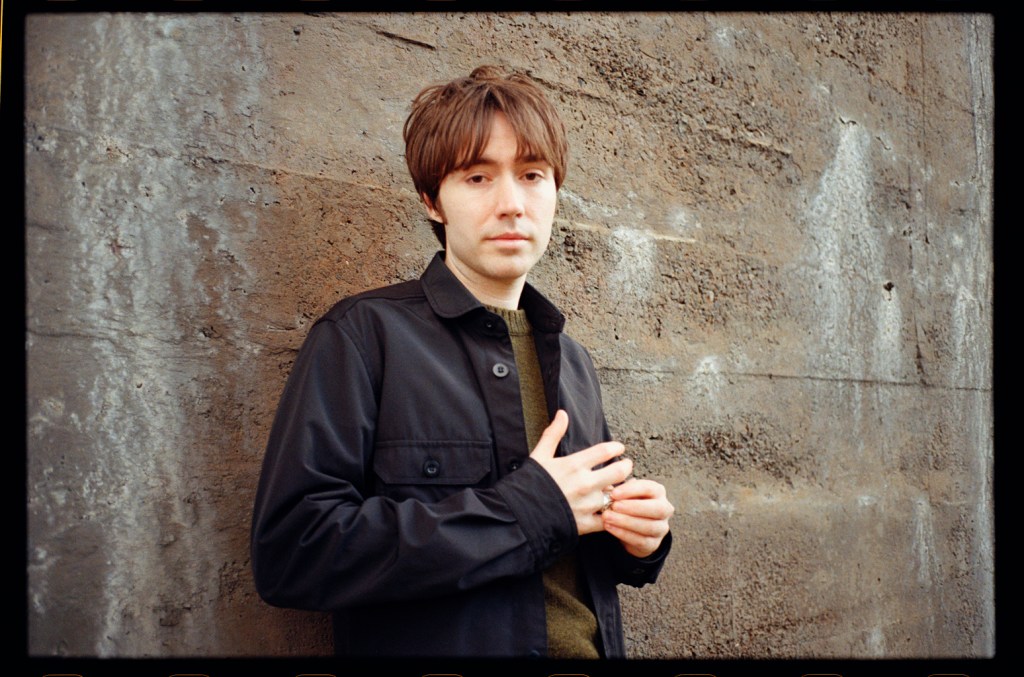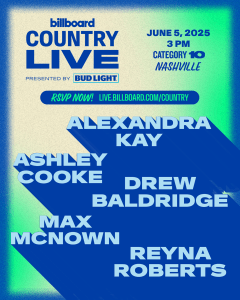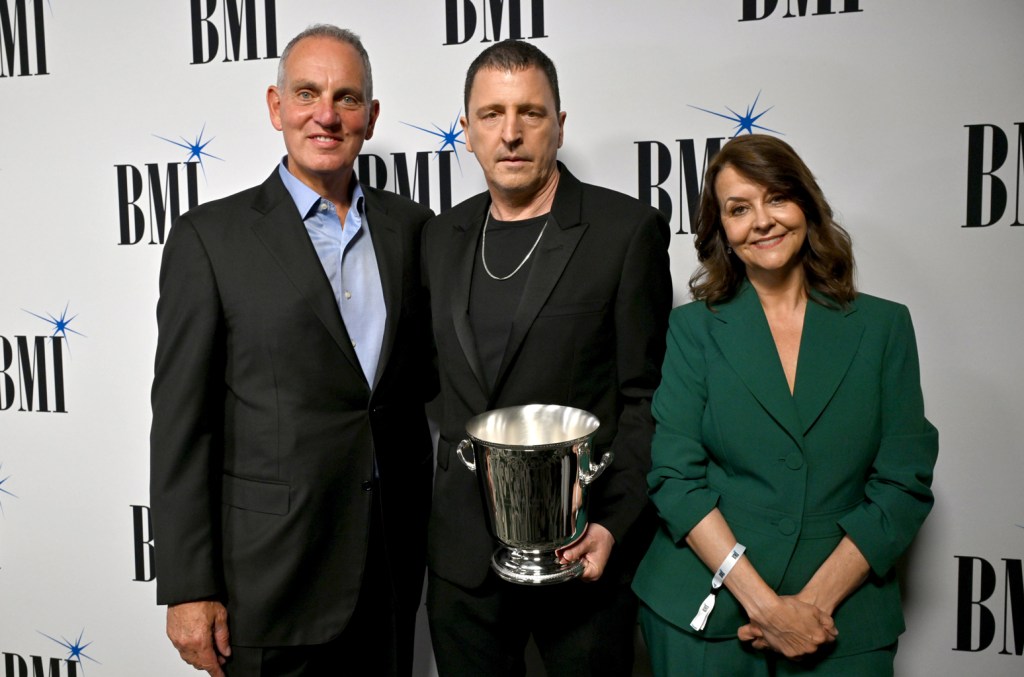Music
Page: 259
Billboard Japan’s Women in Music initiative launched in 2022 to celebrate artists, producers and executives who have made significant contributions to music and inspired other women through their work, in the same spirit as Billboard’s annual Women in Music honors since 2007. This interview series featuring female players in the Japanese entertainment industry is one of the highlights of Japan’s WIM project.
Explore
Explore
See latest videos, charts and news
See latest videos, charts and news
Rena Yamazaki chatted with writer Rio Hirai in the latest installment of the series. The former idol group member continues to express her thoughts on society and culture through her regular TOKYO FM radio show “Rena Yamazaki’s Things I Wanted to Talk to Someone About” and her writing. The 27-year-old shared her feelings about moving from being an idol performer to working in the world of journalism, the possibilities for women’s careers, and the importance of speaking out.
What changes have you felt compared to when you used to be an idol performer?
Trending on Billboard
The biggest change is that I’ve started to be involved in news programs. I appeared in a special program on the Upper House elections in the summer of 2022, just before I graduated from the group, and since then I’ve been invited to appear on shows like Sunday Japon, Wake Up, Mr. Sunday and ABEMA Prime. I was interested in politics and the economy since when I was an idol, but never had a chance to talk about them. Now I’m being asked for my opinion more and feel that’s a big change.
What’s the most rewarding aspect of being a radio personality?
It’s a place where I can take time to convey my thoughts in my own words. I also like how I can get close to my listeners and hear all sorts of stories through the messages I receive. Unlike TV, there’s the difficulty of trying to convey things using only your voice and words without relying on visuals, but that’s also part of the appeal.
Is there any difference in your stance towards work between your idol days and now?
When I was an idol, my stance was to do my best within the role I was given. But now, I think about the way I work and have more opportunities to express my own opinion, so I’ve become more proactive. That means I have more responsibility, but the pressure is a good stimulus.
It’s unusual for former idols to go into journalism. What do you think about the second careers of other idols?
Everyone has their own path to take after graduating from being an idol, but many of them go on to become actresses. Even when I was still in the group, I liked studying things of all genres and using words to communicate, and also had opportunities to appear on TV shows, so I wanted to continue doing work that made use of my intellectual curiosity. That’s why I chose to go into radio and writing.
How did you feel when you were first tapped to be a TV commentator?
I was surprised at first, because I never thought I’d be offered a role in a special program covering the results of the Upper House elections. My management team at the time asked me, “We’ve been offered this, what do you think?” and I thought, “It’d be a challenge worth taking on.” I asked them their decision and they said, “We think it’d be good for your career and a good learning experience,” so I was able to make up my mind to give it my best.
Were you always interested in politics and social issues?
I studied media theory and writing techniques at university, and was also interested in politics and economics. I had friends who went into journalism, and I also regularly read newspapers and online articles. But I never intended to make it my career. Once I started working in the field, though, I felt I needed to study more, so I started reading books and talking to experts.
Has anything surprised you while working in the media?
That what I say has more influence than I thought. Even casual comments can be spread on social media and misunderstood, or even lead to slander. I try to choose my words carefully more than ever before.
When celebrities speak out about politics, they’re often criticized. What do you think about that?
Well, it’s true that when I talk about politics, people sometimes say things like, “You’re a smart-aleck” or “You don’t know what you’re talking about.” But I also think that if I don’t say anything, nothing will change. In fact, it feels like when young women talk about politics, they’re met with stronger opposition than when men do so. For example, when a man in his sixties talks about the same thing, he’s seen as calm and logical, but when a woman in her twenties talks about it, she’s seen as arrogant or trying to act mature.
That’s why I think it’s important to keep speaking out. My views may not always agree with those of viewers and may say something wrong at times, but if I keep quiet, people will end up thinking that young people don’t care about politics. I want to show that there are people who do care and think about it.
In today’s age of social media, what are your thoughts on how information should be disseminated?
Anyone can freely express their opinions nowadays, but I feel that this also means people have a greater responsibility for what they say. In particular, in the world of journalism, what you say can be taken out of context and misinterpreted, so I’ve become more careful about the words I choose.
Extreme opinions tend to spread easily on social media, and it can be hard to have calm discussions. In this context, I think it’s important to make your position clear, but also to offer constructive opinions rather than fueling confrontation. That’s why I try to say “I don’t know” when I don’t understand something, and want to keep being open to listening carefully to what experts have to say.
What do you think is necessary for women’s opinions to be heard?
First of all, I think it’s important to have more opportunities to speak out. I also think that we need to create an environment where women don’t feel afraid to speak out, but rather feel that it’s natural to do so. My ideal is to have a society where people who believe women’s opinions should be equally respected become the majority.
What do you think is necessary for idols and female celebrities to have lasting careers?
I think it’s particularly true in the idol industry that it’s hard for women to have long-lasting careers. It’s easy for “youth” to become part of their value, and in some cases, the range of their activities narrows as they get older. That’s why, when I was still an idol, I wanted to find other work that I could do. That’s how I was able to take the first step into fields like radio and writing, which aren’t restricted by age. What would be ideal is an environment where it’d be easy to return after leaving once, and where women could build up their careers more freely.
What do you think is necessary to make it easier for women to play a more active role in the entertainment industry?
I think it’s important to create a better environment for mental health care. More entertainment agencies are providing access to mental health counselors now, but I feel that there’s still a lack of awareness of the importance of mental health care.
When did you first become aware of the importance of mental health care?
When I was in university. At the time, I found it hard to balance my idol activities with my studies, so I sometimes went to a mental health clinic. Many people feel uncomfortable about seeking this kind of support, but from my own experience, I think it’s necessary to protect yourself.
What would you like to try in the future? And is there anything you want to share with our readers?
I’m planning on publishing two books this year, and currently preparing for that. I also want to continue doing what I’ve been doing as long as possible. I want to tell all my listeners to take care of their bodies and minds. Ultimately, only you can protect yourself. I hope that you’ll remember to take care of yourself, with support from the people around you.
This interview by Rio Hirai (SOW SWEET PUBLISHING) first appeared on Billboard Japan
Charli xcx is a party of one in her new music video for “Party 4 U,” which finds the star revisiting a fan-favorite track from 2020 while spending a day by herself in the middle of nowhere before things get wildly out of control. In the visual released Thursday (May 15) — the five-year anniversary […]
Miley Cyrus is headed to the big screen. On Thursday (May 15), the pop star announced that the accompanying film to her upcoming visual album, Something Beautiful, is coming to theaters for one night only, releasing a new trailer featuring her boyfriend, drummer Maxx Morando. In the preview posted to Instagram, Cyrus appears in various […]

Megan Thee Stallion’s attorney, Alex Spiro, has replied to claims from Tory Lanez’s legal team regarding what they claim is new evidence in the 2020 shooting case that allegedly proves his innocence.
Spiro released a statement on Wednesday (May 14), shutting down the new claims surrounding the case.
“Tory Lanez was tried and convicted by a jury of his peers and his case was properly adjudicated through the court system,” Spiro said in a statement to XXL. “This is not a political matter — this is a case of a violent assault that was resolved in the court of law.”
The statement came in response to Unite the People’s lead consultant, Walter Roberts, who hosted a press conference on Wednesday regarding Lanez, who is listed as an advisory member on the organization’s website, and the 2020 shooting case.
Trending on Billboard
Roberts claimed that he acquired new evidence in the case proving Lanez’s innocence. He said he was approached by Bradley James, who claimed to be Megan Thee Stallion’s friend, Kelsey Harris’ bodyguard, on the night of the July 2020 shooting. Roberts added that James allegedly overheard a conversation in which Harris admitted to having the gun during the shooting, and that according to James, Lanez did not shoot anyone.
Billboard has reached out to Megan Thee Stallion’s rep and Unite the People for comment.
Lanez was convicted on three felony counts of shooting Megan Thee Stallion in the feet following an argument outside a July 2020 party in Hollywood Hills. According to prosecutors, Megan got out of a car during an argument when Lanez shouted, “Dance, b—h!” and fired at her feet.
Lanez was ultimately sentenced to 10 years in prison, and Thee Stallion was granted a restraining order against the Canadian singer in January.
Earlier this week, Lanez was attacked in prison, during which he was reportedly stabbed 14 times, and suffered from collapsed lungs. He was transported to a hospital near the California Correctional Institution, where he was serving his sentence.
A statement on his Instagram account said that Lanez was stabbed in his head, neck, back and torso, but is now breathing on his own. “Despite being in pain, he is talking normally, in good spirits and deeply thankful to God that he is pulling through,” the statement said. “He also wants to thank everyone for the continued prayers and support.”
If you have ever felt an unfamiliar ache somewhere deep inside – born of yearning, heartbreak or some other kind of romantic grief – then Matt Maltese probably has a song for that. His debut LP Bad Contestant, released via Atlantic Records in 2018, mixed piercing personal reflections with surreal, writerly metaphors involving lucid dreams, fish, wartime food rations and chocolate-based sexual exploits, all atop a warm guitar and organ combo.
At the apex of the record was the swooning ballad “As the World Caves In,” an apocalyptic depiction of an imaginary love affair between Donald Trump and former British prime minister Theresa May. The track experienced an unprecedented resurgence in 2021 when it broke into the U.S. Spotify Charts (No. 90) off the back of sudden TikTok virality, leading to Maltese finding new, unlikely fans in Doja Cat and BTS member V.
Trending on Billboard
It was the album’s dark humor, and how its author divulged his gnarliest impulses across 11 tracks, that set it apart upon release. Here, Maltese crafted narratives that feel immersive, brutal and soberingly real — though seven years on, he looks back on that era as a time where he felt “overwhelmed” by what the moment required from him: signing with a major label, topping “Ones to Watch” lists, putting out jaunty baroque-pop in a landscape that was dominated by post-punk acts.
It’s a feeling that first began gnawing at Maltese when he was deep in the songwriting for Hers (due May 16), his fifth studio album and most vulnerable and engrossing work to date. “I used to have lyrics that were often outrageous, which came from a combination of thinking I was smarter than I was while also not really knowing myself yet. I could never fully cry about something without being sarcastic at the same time,” he tells Billboard U.K. “But now, I’ve realised that I don’t get a kick out of being ‘shocking’ in my writing anymore.”
When we meet Maltese in a busy central London café, he is soft, eloquent and deadpan in conversation, often laughing when he makes such pronouncements – which repeatedly come with an explicit caveat about how privileged he is to do what he does. Spring is breaking through, and the glass-walled corner we find ourselves in lets in ample light. “At the start [of the creative process], I thought, ‘No one is in desperate need of a new Matt Maltese album. I knew it was worthwhile when I began producing it solely for myself,” he says, smiling.
He’s right in a way. Maltese has grown into a stunningly prolific musician with over a billion combined Spotify streams to his name. Alongside five full-length records (including Hers), he has released four EPs alongside 2024’s Songs That Aren’t Mine, a collection of covers of tracks by a diverse cast of musical inspirations, from Sinead O’Connor to Sixpence None the Richer. The record also featured vocal takes from rising acts Liana Flores, Dora Jar and Searows, the latter whom is signed to Maltese’s own imprint Last Recordings On Earth (via a partnership with Communion Records).
Elsewhere, he has quietly become an influential figure in the U.K. scene as a label boss and songwriter. He’s spent time working with Grammy winner Laufey, as well as British sensations Celeste, Jamie T and Joy Crookes; Maltese has also been sought out by newer names such as Etta Marcus and Matilda Mann. Despite being dropped by his label shortly after the release of Bad Contestant, he’s managed to spin that moment into a positive and collaborative ethos, one that has carried him through a trajectory that has been anything but conventional.
“At the beginning of my career, I was acting like Noel Gallagher when it came to the topic of co-writing,” he explains. “I used to think, ‘What a joke, who needs people to help them write?’. I was really quite snobbish about it. But then, things shifted when I turned a corner after having had my ‘period of failure’ by getting dropped. It was the ego knock I needed.”
In his early 20s, Maltese used an exaggerated version of himself as a Trojan horse to share his deepest feelings. Now, he understands that music is the place where he can find clarity and optimism. It’s what enables him to tell the truth and not let discomfort get the better of him.
This shift in mindset manifests itself in the cover art for Hers’ lead single, “Anytime, Anyplace, Anyhow,” which shows Maltese immersed in a moment of passion with his partner. At times he strips back the track’s gorgeous, tumbling arrangements – which, sonically, feel flush with the jitters of new love – to reveal little more than a gentle guitar. It forces listeners to consider his playful albeit blunt language, full of a sense of a worldview having been upturned: “I’m apoplectic looking at the stars/ They look like you with your top off.”
Maltese views Hers as a warts-and-all project about allowing yourself to fall in love when you are a wounded cynic. “It felt really good, for the first time, to sing about the physical side of being in a long-term relationship,” he says, stewing over a pot of tea. “So much of this record felt like I was dipping my toe into a whole new pool of emotion.”
Hers marks the first record that Maltese has produced entirely himself since 2020’s hushed and reflective Krystal. Across the LP, he is joined by friends from Wunderhorse (drummer Jamie Staples) and Gotts Street Park (guitarist Joe Harris) to flesh out his acoustic arrangements. “Pined for You My Whole Life” starts hazily, cracking open into a R&B-flecked melody two-thirds of the way through. “Always Some MF,” which tackles jealousy and deceit, sounding increasingly despairing before an enjoyably rambling piano solo takes over.
When Maltese takes these songs to stages across the U.K. and US through the fall, he says will do so without big displays or sets. Since becoming an independent artist, he has graduated to bigger venues year upon year (a night at London’s iconic Roundhouse is in the diary for November), but he would rather talk about the marvel of collaborative spirit than accolades.
“Getting out of my own head and supporting the visions of others has only pushed me further,” he notes. 2024 bore witness to two major milestones: his stage composition debut and the launch of the aforementioned Last Recordings on Earth. The former saw him partner with the Royal Shakespeare Company, writing music for a production of Twelfth Night. The latter, meanwhile, has allowed Maltese to share the learnings of his early career with Searows and new signee Katie Gregson-Macleod, a singer-songwriter from the Scottish Highlands.
Last year, Gregson-Macleod was dropped by a major label over creative differences, or “things that were not compatible with my vision of my life,” as she put it in a nine minute-long clip posted to TikTok in January. In the following weeks, she met Maltese for a coffee in London; the pair bonded over the parallels in their respective artistic journeys, leading to her landing a new deal through which she is releasing her Love Me Too Well, I’ll Retire Early EP in July.
From The Snuts to STONE and Crawlers, a series of U.K. indie and rock acts have similarly spoken out about struggling to fit into the major label system due to shifting commercial expectations, all having chosen to take the independent route in order to rebuild their respective careers. “Knowing our shared experiences, I felt at peace with stepping back into a label partnership if it was Matt at the helm,” Gregson-Macleod tells Billboard U.K. over email.“I just feel at ease, and confident with him by my side. For one, working with a songwriter I respect as much as Matt inspires me to constantly challenge myself. But also, there’s this quiet understanding, unwavering support and trust in me from his end that is really quite rare in this industry.”
Labelmate Searows (born Alec Duckart) concurs: “Matt’s kindness, talent, drive and humour have proven to me that art and passion can be your life’s work and you don’t have to sacrifice who you are in order to be successful. I have been so lucky to have his friendship and guidance, and understanding of who I want to be as an artist.”
Maltese attests maintaining a busy schedule to a work ethic gleaned from growing up with his Canadian parents in Reading, who would encourage him to travel into the capital as a teenager to pursue music further. Over time, he fell in with an emerging punk scene in south London, which furnished him with a close group of musicians (Goat Girl, Shame, Sorry) despite being worlds apart in sound and aesthetic from his peers.
“I was given a sense [by journalists] of being part of a quite elite group,” he recalls. “I was surrounded by all of these wonderful bands. We were all hanging out together, feeling like we were part of something special, and it’s really easy to get drunk on that – especially when you’re being given cultural capital.”
Press duties, in other words, became what Maltese had to do to help fulfill his passion of working with other creative people. He recalls, at age 18, being asked by a BBC radio station to record a cover of John Lennon and Yoko One’s “Happy Xmas (War Is Over),” only to turn the offer down in fear of “being seen as a sell-out” unless he was able to rework the song to his own pleasing.
He sighs at the memory. “It’s decisions like that that make me want to pull out my own skin. Though I look back and realize I was just a kid with an inflated sense of self, who was getting attention from lots of different angles. It’s been a process of reckoning with that time, really.”
Hers is marked by this exploration, of learning to loosen up and let go. Though Maltese says he still struggles to listen to his earliest material – particularly the jaunty and gruesomely funny “Guilty” – it’s his ongoing evolution that has taught him to remain curious, to never stay in one place for too long. For all his palpable excitement about the future, Maltese is feeling an equal amount of compassion towards where he’s been and what it has taught him.
“As you get older, you realize that everyone is flawed as hell. It’s a choice to not live in bitterness, particularly as someone that has had to re-angle the lens in which they view their own insecurities,” Maltese offers. “But weirdly, falling in love helps with all of that. It really does.”

The Sweet Relief Musicians Fund launched a fundraiser on Thursday (May 15) to benefit the Music’s Mental Health Fund featuring signed memorabilia and experiences from Coldplay, R.E.M., Teddy Swims, The Mars Volta, Nickelback and more. Explore See latest videos, charts and news See latest videos, charts and news The Mental Health Fund, a partnership between […]
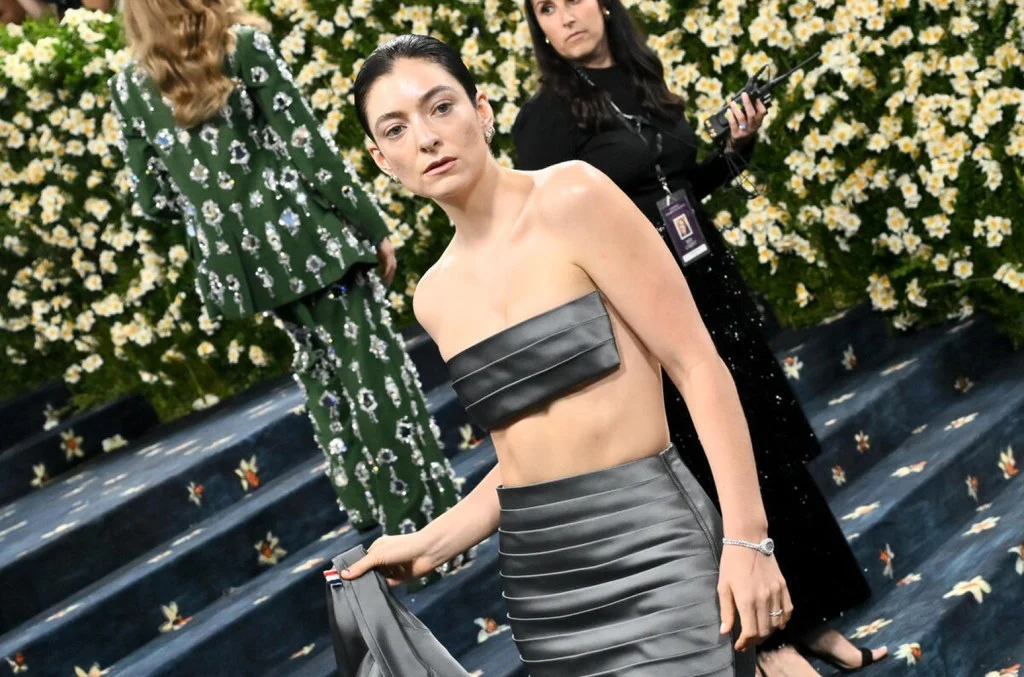
In the lead-up to her new album Virgin, Lorde has started to slowly open up about her broadening gender identity with the world. But before she was ready to do that, she confided in one of her new friends: Chappell Roan.
In a Rolling Stone cover story published Thursday (May 15), the New Zealand native revealed that she and the “Pink Pony Club” singer have gotten quite close over the past year, and that one of the things they’ve discussed is Lorde’s changing relationship with gender. When asked how she identifies now, the “Royals” artist told the publication, “[Chappell Roan] asked me this … She was like, ‘So, are you nonbinary now?’”
“I was like, ‘I’m a woman except for the days when I’m a man,’” Lorde continued. “I know that’s not a very satisfying answer, but there’s a part of me that is really resistant to boxing it up.”
Trending on Billboard
The musician also explained that she still identifies as a cisgender woman who uses “she” and “her” pronouns. But the complexities of her newfound gender fluidity informed much of the June-slated Virgin, the opening track of which Rolling Stone reveals finds her declaring, “Some days I’m a woman/ Some days I’m a man.”
Even so, Lorde added that she doesn’t think her gender expression is “radical” compared to what most transgender and nonbinary people face on a daily basis. In the United States in particular, the rights of LGBTQ people have been under constant threat for years, something Roan — a longtime advocate for the community and a queer-identifying artist herself — has spoken out about many times.
“I see these incredibly brave young people, and it’s complicated,” Lorde said. “Making the expression privately is one thing, but I want to make very clear that I’m not trying to take any space from anyone who has more on the line than me. Because I’m, comparatively, in a very safe place as a wealthy, cis, white woman.”
The star’s embrasure of her new gender expression is one of several personal transformations that has occurred since she last dropped an album, 2021’s Solar Power, four years ago. In addition to breaking up with Universal Music executive Justin Warren after about eight years together — “It was so painful, as they are, but there was real dignity to it,” she told the publication of the split — Lorde also recovered from an eating disorder, something she’s also been increasingly open about in the weeks ahead of Virgin‘s June 27 release.
“I felt so hungry and so weak,” she recalled of being obsessed with calories and protein intakes around the time Solar Power came out, specifically the day it dropped. “I was on TV [that] morning, and I didn’t eat because I wanted my tummy to be small in the dress. It was just this sucking of a life force or something.”
See Lorde on the cover of Rolling Stone below.
Chris Brown was arrested at his hotel in Manchester, U.K. on Thursday morning (May 15) over what British authorities alleged was an attack on a music producer at a London nightclub two years ago. According to The Independent, Brown, 36, was detained by Metropolitan Police at the five-star Lowry Hotel in Salford just hours after he arrived on a private jet.
Explore
Explore
See latest videos, charts and news
See latest videos, charts and news
The singer was arrested on suspicion of grievous bodily harm, with officials telling the paper, “A 36-year-old man was arrested at a hotel in Manchester shortly after 2am on Thursday, May 15 on suspicion of grievous bodily harm,” without naming Brown, per protocol. “He has been taken into custody where he remains. The arrest relates to an incident at a venue in Hanover Square on February 19, 2023. The investigation is being led by detectives from the Central West Area Basic Command Unit.”
According to the paper, producer Abraham Diaw accused Brown of smashing him over the head with a bottle and kicking him at the Tape nightclub on that night, with Diaw previously telling The Sun on Sunday that Brown “hit me over the head two or three times. My knee collapsed as well.” Diaw has also lodged a civil complaint against Brown for $16 million seeking damagers for injuries and losses as a result of the alleged incident, according to The Independent.
At press time a spokesperson for Brown had not returned a request for comment on the arrest.
Brown has a long history of arrests and allegations of violence, including his 2009 beating of then-girlfriend Rihanna, which led to him being charged with felony assault; that incident resulted in the U.K. denying Brown a visa to travel there for a short tour in 2010. In 2012 he was involved in a brawl with Drake and his entourage at a N.Y. nightclub that injured eight people, followed by an altercation with Frank Ocean over a parking space in West Hollywood in 2013.
The singer was also arrested for felony assault for punching a man outside a hotel in Washington, D.C. in 2013, which led to him being charged with a probation violation and a sentence of 131 days in lockup. He was also allegedly among the men behind an assault on a man during a basketball game at Palms Casino Resort in 2015, an incident his team denied he was involved in. In 2016, Brown was arrested at his home on suspicion of assault with a deadly weapon and, a year later, was court-ordered to stay 100 yards away from ex-girlfriend Karrueche Tran after she told a court he’d repeatedly threatened her. Among other similar incidents, Brown and several members of his entourage were named in a lawsuit over an alleged assault following one of the singer’s shows in Fort Worth, Texas in which Brown and several accomplices allegedly “brutally and severely beat” four men.
Brown is preparing to launch the European leg of his Breezy Bowl XX Tour, which is slated to kick off on June 8 at Johan Cruijff Arena in Amsterdam. It was not known at press time if Brown’s arrest will hamper his ability to play a planned series of June shows in the U.K. on the tour.
At press time it was also unclear if Brown was still in custody and it did not appear as if he’d commented on the arrest on his social feeds; a spokesperson for the Metropolitan Police department had not returned Billboard‘s request for comment at press time.
Billboard Country Live is set to return to Nashville this summer, with the Bud Light-presented, two-day tentpole celebration highlighting rising country stars and industry tastemakers on June 5-6 at venue Category 10 in downtown Nashville.
Explore
See latest videos, charts and news
See latest videos, charts and news
The country music celebration will launch on Wednesday, June 4, with an exclusive gathering held on the rooftop of Category 10, honoring Billboard’s Country Power Players and recognizing the most influential executives shaping and leading the country music genre today.
On Thursday, June 5, a showcase concert presented by Bud Light will spotlight rising artists, with live performances from Alexandra Kay, Ashley Cooke, Drew Baldridge, Max McNown and Reyna Roberts. Inside Billboard’s video lounge, Major League Baseball will film exclusive interviews with the country stars featured in players’ walk-up songs.
Trending on Billboard
The celebration will continue Friday, June 6, with a second evening of music that will feature “Country on the Rise,” honoring the future of the genre with a lineup set to be announced in coming weeks.
Each of the artists featured in the showcase concert on June 5 have earned ever-heightening career milestones in recent years. In 2024, Baldridge earned a top five hit on the Country Airplay chart with “She’s Somebody’s Daughter (Reimagined).” Kay, who signed with BBR Music Group/BMG Nashville this year, also released her latest single “Cupid’s a Cowgirl.” Cooke earned a No. 2 Country Airplay chart hit with “Your Place” and recently teamed with Joe Jonas on the song “All I Forgot.” McNown broke through with his song “A Lot More Free,” while his song “Better Me for You (Brown Eyes)” cracked the top 30 on the Hot Country Songs chart. Roberts released her debut album, Bad Girl Bible Vol. 1, in 2023 and last year was featured on the song “Blackbiird” from Beyoncé’s Grammy-winning Cowboy Carter album, as well as providing background vocals on the album’s track “Tyrant.”
Since its origin in 1894, Billboard has become the essential barometer of music success, through its authoritative charts, news, detailed analysis, multi-platform storytelling and multiple events that celebrate artists and various industry sectors. Billboard’s annual events also include the Billboard Power 100, Billboard Women in Music, Billboard Latin Music Week and Billboard Live.
Atticus Ross was named a BMI Icon at the 2025 Film, TV and Visual Media Awards on Wednesday (May 14), in recognition of his body of work across film and television. The private ceremony held at the Beverly Wilshire Hotel in Beverly Hills, Calif., was hosted by Mike O’Neill, BMI president & CEO, and Tracy McKnight, BMI vp, creative, film, TV & visual media.
O’Neill presented Ross with the BMI Icon Award, expressing that his “innovative spirit and passion for pushing the boundaries of composition have literally reengineered the way we experience storytelling.” He went on to say, “we are very proud to honor your incomparable contributions to the world of music as a composer, a rock pioneer and an icon.”
Trending on Billboard
Ross was emotional upon receiving the honor and stated, “The thing I love about film music is that there aren’t any rules, there aren’t any pros. Essentially, to my mind, it’s all about how we make people feel, and that’s what music is about.” Moreover, he voiced, “I put a lot of effort into making sure that this never feels like a job. I wake up every day grateful for the opportunity to make music, this is my dream, and I don’t take it lightly.”
Ross is a multifaceted musician, composer and producer who has received two Oscars, two Grammys, one Primetime Emmy, one BAFTA Award, three Golden Globe Awards and three Critics Choice Awards. He’s also won 18 BMI Film, TV and Visual Media Awards, as well as one BMI Country, one BMI Pop and one BMI R&B/Hip-Hop Award.
In addition to his work as a composer, Ross has had a successful career as a member of Nine Inch Nails and a longtime collaboration with bandmate Trent Reznor. Together, they’ve created some of the most memorable film and TV scores of the past two decades, including The Social Network, The Girl with the Dragon Tattoo, Soul, Challengers and Watchmen. Ross has also collaborated with his brother Leopold Ross and wife Claudia Sarne on movies such as The Book of Eli and Triple 9 and series like Black Mirror, Dear Mama and Shōgun.
Previous BMI Icon Award recipients include Terence Blanchard, Mychael Danna, Alexandre Desplat, Ramin Djawadi, Harry Gregson-Williams, James Newton Howard, Christopher Lennertz, Thomas Newman, Rachel Portman (PRS), Mike Post, Alan Silvestri, Brian Tyler and John Williams.
During the ceremony, composers were honored for music featured in the past year’s top-grossing films, top-rated network television series, highest-ranking cable network and streamed media programs, and the most popular video games. Multiple award winners, in addition to Ross, included Fil Eisler, Tom Howe, Andrew Lockington, Blake Neely, Julia Newman, Mike Post, Carlos Rafael Rivera, Tyler Strickland and Atli Örvarsson.
The event celebrated 29 first-time award winners including Kathryn Bostic, Goh Nakamura, Kara Talve, Dara Taylor and Zack Ryan.
For a complete list of winners, visit here.

 State Champ Radio
State Champ Radio 